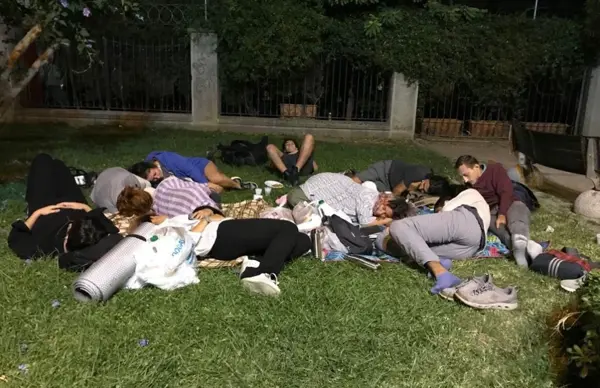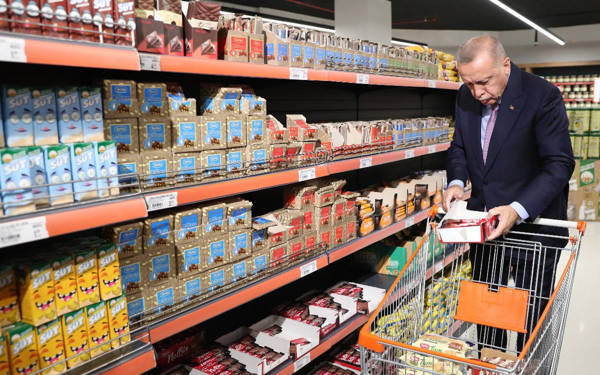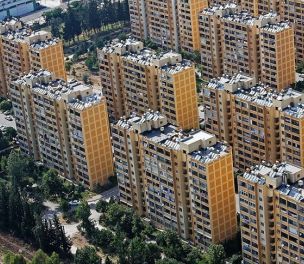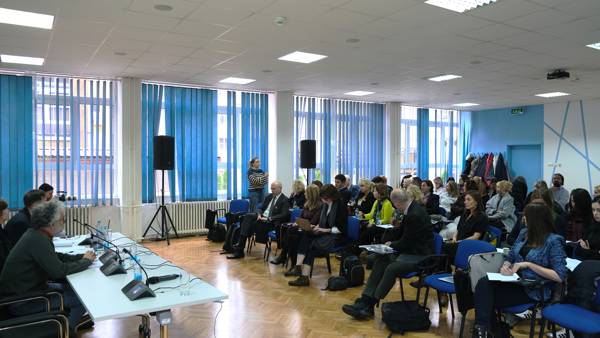An unprecedented surge in housing and rent prices has left Turkey in the throes of a housing affordability crisis, with citizens caught in the crossfire of eviction pressure and the challenge of meeting their basic living expenses.
The Central Bank's housing price index reveals a nominal surge of 447% from September 2021, marking the onset of the steep price increase, to September 2023, the date of the latest index release.
The impact has reverberated into rent prices, which increased by 309% between June 2021 and June 2023, according to Bahçeşehir University’s Real Estate Market Outlook reports.
To address the soaring rent prices, the parliament introduced a rent increase cap of 25% in June 2022. The law, extended by one year in June, aimed to protect tenants but inadvertently created disparities between long-standing tenants and new renters.
Current tenants are protected from increases beyond 25%, but vacant apartments can be rented at much higher rates, leading to tensions and violent incidents as landlords seek to capitalize on the higher rents offered by new tenants.
Landlord violence
The escalation has fueled a surge in tenant-landlord disputes, accounting for approximately 65% of cases filed in the penal courts of peace in İstanbul during the first quarter of 2023. This surpassed the total number of landlord-tenant disputes recorded for the entire year of 2022.
The conflict has spilled into violent altercations, which caused at least 11 fatalities and 46 severe injuries between January and September. Hundreds were detained and 14 individuals were arrested in connection with these clashes.
Beyond casualties, bizarre landlord-tenant conflicts have emerged, ranging from offering millions to tenants to pouring poisonous substances on doorsteps. In a particular instance, a disagreement escalated to the point where the landlord harassed a woman tenant by setting up a dating profile on her behalf.
Discussions in the parliament
In response to the crisis, the main opposition CHP proposed a parliamentary inquiry on Thursday to investigate the root causes and potential solutions. The proposal was ultimately rejected by the ruling AKP and their allies MHP.
CHP deputy Gülcan Kış, who submitted the proposal, expressed concern over the situation, saying, "We witness numerous incidents across the country where people, living below the poverty line, are thrown into the streets with their belongings, subjected to violence by landlords, and even deadly clashes due to their inability to pay rent.”
In the 30 major cities where 75% of Turkey's population resides, average rental prices exceed 79% of the minimum wage of 11,402 liras, the MP noted. The fact that about half of the country’s workforce is employed at the minimum wage and the earnings of 70% of private sector employees falling within 120% of the minimum wage, underscores the challenge presented by soaring housing costs.

Erdoğan unveils social housing project amid record-high housing prices
In addition to the rent increase cap, the government provides a rent assistance of 1,500 liras to the families in need. However, this aid also falls short of alleviating the challenges, said Felicity (Saadet) Party MP Mahmut Arıkan.
“If assistance to tenants is intended - which must be done - the way to do it is to combat the factors causing rent increases,” he remarked in the session. “Limiting rent increases is the same as providing pasta and coal aid to millions they left unemployed and starving."
Onur Düşünmez, an HDP deputy, emphasized the struggles of public servants and workers to meet basic needs after deducting rent from their salaries.
Living costs
According to data from the Endeksa real estate site, the average rent in the capital city, Ankara, stands at 13,850 liras (1 US dollar = 28.99 Turkish liras). Meanwhile, the monthly minimum food expenditure for a family of four living in Ankara was 14,025 liras in November, according to the monthly survey of the Türk-İş trade unions confederation.
When considering the total mandatory monthly expenses encompassing food, clothing, housing (rent, electricity, water, fuel), transportation, education, health, and other essential needs, termed as the poverty line, the cumulative amount reaches 45,686.81 liras, showed the survey.
Turkey continues to dominate global housing price indexes, as indicated by a recent Knight Frank report for the first quarter of 2023, when housing prices in the country saw a 132.8% increase. The six-month change was 40.8% and the three-month change was 22.2%. The country's 12-month rolling inflation rate stood at 70% by the end of March.
Despite Turkey's transition towards a more orthodox monetary policy following the May elections, Knight Frank anticipates that this shift is unlikely to result in a rapid decrease in inflationary pressures. The substantial 22% quarterly increase suggests that there is more to come, according to its report.
Reasons behind the surge
A report published by the Economic Policy Research Foundation of Turkey (TEPAV) in late August outlines several reasons for the massive increase in housing and rent prices in the country. The report highlights the rapid escalation of construction costs in an inflationary environment, with factors such as currency depreciation, soaring land and energy prices, and increased costs of construction materials and labor contributing to the surge.
Additionally, the ease of property sales to foreigners since 2012 has further driven up demand, particularly in tourism regions, intensifying housing price and rent hikes. This year saw a decrease in housing sales to foreigners, following the record-high number of sales in 2022.
.jpg)
Subletting surges in İstanbul amid housing crisis
The TEPAV report also underscores the impact of negative real interest housing loans, where a rapid decline in interest rates after 2019 led to increased demand for housing but resulted in decreased loan affordability due to negative real interest rates amid high inflation. Changes in zoning plans, including density increases and urban transformation projects, are also identified as influential factors affecting housing supply and demand dynamics.
Lastly, the report cites the insufficient increase in incomes, especially for minimum wage and low-income earners, as a significant contributor to the widening gap between housing prices and affordability, exacerbating the housing crisis in Turkey.
These factors have transformed housing into an investment tool, undermining the fundamental right of the people to secure shelter. This shift is evident in the country's housing ownership rate, which declined from 61.1% in 2006 to 57.9% in 2022.
.jpg)
İstanbul grapples with housing crisis while thousands of homes remain vacant
With no signs of governmental policy change on the horizon, the plight of the country's low and middle-income segments could deteriorate even further. (VK)





















